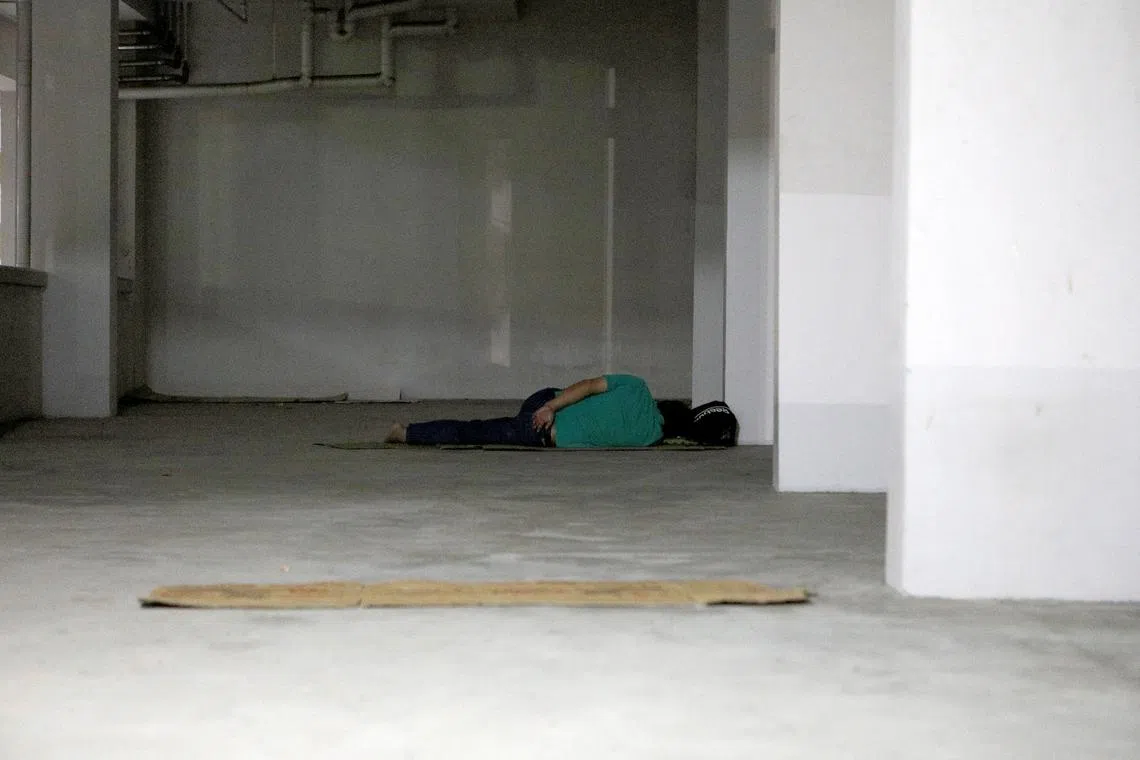60% of beds at S’pore’s transitional shelters for homeless persons and families occupied yearly
Sign up now: Get ST's newsletters delivered to your inbox

In 2022, 530 rough sleepers were found, a big drop from the 921 rough sleepers seen in a previous single-night count in 2019.
PHOTO: ST FILE
Follow topic:
SINGAPORE - About 60 per cent of the 720 beds available at Singapore’s transitional shelters for rough sleepers were occupied yearly from 2021 to 2023.
There are seven such transitional shelters for these homeless persons and families in need of temporary residential support, and individuals stay in the shelters for about nine months on average, Senior Parliamentary Secretary for Social and Family Development Eric Chua said in Parliament on Oct 16.
He gave these updated figures in response to Mr Darryl David (Ang Mo Kio GRC), who had also asked whether there are plans to help the homeless transition from a shelter to a more permanent place of residence.
To help residents in these transitions, social workers at the shelters work closely to address the needs of these individuals and families, and support them in securing stable long-term housing like rental housing or purchased flats.
In 2022, 530 rough sleepers were found,
The latest figures are from the Ministry of Social and Family Development’s (MSF) 2022 Street Count of Rough Sleepers, published in April 2023.
In the report, MSF said there are touchpoints islandwide to provide support to rough sleepers.
One is the Peers Network, a collaboration between community groups, social service agencies and other government organisations to journey with rough sleepers in addressing their issues and securing stable housing
Between July 2019 and March 2023, the Peers Network supported more than 1,600 rough sleepers.
Transitional shelters, funded by MSF, provide onsite social work intervention to support clients towards stable housing. There is no cap on the length of stay at the shelters, although social workers work with residents to resolve any challenges impeding their access to stable long-term housing as soon as possible.
Between April 2020 and March 2023, 340 individuals from the shelters progressed to longer-term housing.
Based on requirements found online, those going to the transitional shelters must be either a Singapore citizen or permanent resident, and must have exhausted all other means of accommodation.
Social service agencies Allkin Singapore and New Hope Community Services are part of the network of agencies that run the transitional shelters.
In a supplementary question on Oct 16, Mr David asked for some insight on how easy or quick it would be for a rough sleeper or homeless person to get a place in these shelters.
Mr Chua said there is no one answer, as every case is unique.
“Those of us who are involved in this piece of work would know that the situational factors and difficulties that each homeless or rough sleeping person has to deal with is often complex, and interlocking,” he said.
“What we need to do is to make sure that we can work with community groups, individual volunteers on the ground and government agencies to offer the most thoughtful and customised support to each of these cases. So really, there’s no one quick answer for the cases.”
Members of the public who encounter rough sleepers who need support or shelter can either e-mail Peers at msf_peersoffice@msf.gov.sg


